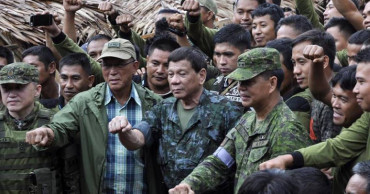martial law
South Korea’s ex-defense minister finally arrested over martial law
South Korea’s former Defense Minister Kim Yong Hyun was formally arrested Wednesday on charges of rebellion and abuse of power over his role in the brief imposition of martial law last week. The unprecedented move, lasting just six hours, has triggered widespread protests, criminal investigations, and impeachment efforts targeting President Yoon Suk Yeol and key officials.
The Seoul Central District Court approved Kim’s arrest, citing the seriousness of his alleged crimes and the potential for evidence tampering. Accused of orchestrating the martial law decree, Kim allegedly ordered troops to block lawmakers from overturning the decree in parliament. Despite his efforts, the National Assembly convened and unanimously rejected the order, forcing the government to rescind martial law by early December 4.
Kim, who resigned last Thursday and has been detained since Sunday, issued an apology, accepting sole responsibility and pleading for leniency for the troops involved. Prosecutors have 20 days to decide whether to indict him, with rebellion charges carrying a maximum penalty of death.
Parliament, controlled by the opposition Democratic Party, has passed a bill to appoint an independent special counsel to investigate Yoon and top military officials, citing mistrust in public prosecutors. During a parliamentary hearing, Army Special Warfare Commander Kwak Jong-keun testified that Kim directly ordered troops to block lawmakers and claimed Yoon instructed him to forcibly remove them if necessary.
Read: South Korea weighs travel ban on President Yoon
Additional testimony revealed plans to detain political opponents, with senior military and intelligence officials implicating Yoon and his associates. These revelations have intensified calls for accountability, as opposition leaders argue the martial law decree violated constitutional limits, which only allow such measures during war or comparable emergencies.
Critics contend the decree sought to suppress liberal opposition forces, which Yoon labeled as “anti-state.” The Democratic Party has pushed for Yoon’s impeachment, along with motions targeting other senior officials. Yoon narrowly avoided impeachment on Saturday but faces renewed efforts from opposition lawmakers, who plan another vote.
If impeached, Yoon’s presidential powers would be suspended until the Constitutional Court decides his fate. A dismissal would trigger a presidential election, potentially reshaping South Korea’s political landscape amid ongoing tensions.
Source: With inputs from agencies
1 year ago
Ex-South Korean defense chief held amid Martial Law controversy
South Korean prosecutors have detained former Defense Minister Kim Yong Hyun in connection with the recent imposition of martial law, marking a significant development in a political crisis that has roiled the nation. Kim, who allegedly proposed the controversial decree to President Yoon Suk Yeol, was taken into custody on Sunday, making him the first high-ranking official detained over the incident, according to local media reports.
Kim voluntarily appeared at the Seoul Central District Prosecutors' Office, where his mobile phone was confiscated before being transferred to a detention center. Authorities also searched his former office and residence. Prosecutors and detention officials have yet to issue formal statements on the matter.
The detention comes days after President Yoon narrowly avoided impeachment, as his ruling People Power Party boycotted a parliamentary vote to prevent the opposition from reaching the two-thirds majority needed to suspend his presidential powers. Despite this, the opposition Democratic Party has vowed to file a fresh impeachment motion.
Martial Law and Political Turmoil
The martial law declaration earlier this week saw troops encircle the National Assembly and helicopters hover over the building, prompting immediate backlash. Parliament unanimously overturned the decree, forcing Yoon’s Cabinet to rescind it by early Wednesday morning.
Kim has been accused by opposition lawmakers of orchestrating the martial law order and directing troop deployments to the National Assembly. The Defense Ministry has suspended three senior military commanders implicated in the event.
Read: South Korean president apologises for imposing martial law
In a statement issued through the Defense Ministry, Kim took full responsibility for the military’s actions, stating, “All troops who performed duties related to martial law were acting on my instructions, and all responsibility lies with me.”
Charges and Investigation
The Democratic Party has labeled the martial law declaration an unconstitutional rebellion or coup, filing legal complaints against at least nine individuals, including Yoon and Kim. Under South Korean law, sitting presidents are mostly immune from prosecution, except in cases of rebellion or treason, leaving open the possibility of further investigations into Yoon’s actions.
Prosecutor General Shim Woo Jung confirmed plans to investigate rebellion charges following the opposition's formal complaints. Meanwhile, President Yoon issued an apology on Saturday, pledging accountability and promising not to pursue another attempt at martial law.
Political and Public Reaction
The martial law declaration—the first in South Korea in over 40 years—has plunged the nation into political chaos, drawing criticism domestically and internationally. Yoon justified the decree by accusing parliament of obstructing state affairs and harboring "anti-state forces."
Public sentiment appears to favor impeachment, with recent surveys showing widespread support for Yoon's ouster. His approval ratings have been further damaged by scandals involving himself and his wife, as well as criticism from his own party over the martial law imposition.
The crisis has alarmed South Korea's allies, including the United States and Japan, and deepened divisions within the ruling conservative People Power Party, which has so far resisted calls for Yoon's impeachment.
Read more: South Korean President Yoon under fire for Martial Law declaration
As protests intensify and political uncertainty grows, the detainment of Kim Yong Hyun marks a pivotal moment in South Korea’s ongoing political upheaval.
Source: With inputs from agencies
1 year ago
Resignation of South Korean President Yoon demanded over Martial Law
South Korea’s political landscape was shaken on Wednesday as the main opposition Democratic Party called for President Yoon Suk Yeol’s immediate resignation or impeachment. The demand came hours after Yoon rescinded a controversial martial law declaration, which had briefly brought military troops to parliament.
Yoon’s abrupt announcement of martial law on Tuesday evening aimed to combat what he termed “anti-state” forces but was overturned by a unanimous parliamentary vote. This marked South Korea’s first use of martial law in over 40 years, harking back to its pre-democracy era.
Opposition Outrage and Impeachment Threat
The Democratic Party, holding a parliamentary majority, condemned Yoon’s actions as unconstitutional and accused him of rebellion.
“President Yoon Suk Yeol’s martial law declaration was a clear violation of the constitution... a grave act of rebellion,” the party said in a statement, promising impeachment proceedings if Yoon refused to step down.
An impeachment would require a two-thirds parliamentary vote, needing support from at least 200 lawmakers. The Democratic Party and smaller opposition factions collectively control 192 seats. Notably, 18 members of Yoon’s ruling People Power Party (PPP) joined the 190-0 vote to annul the martial law.
If impeached, Yoon would be stripped of presidential powers pending a Constitutional Court ruling, with Prime Minister Han Duck-soo assuming interim responsibilities.
Yoon’s Declaration and Military Deployment
Yoon’s martial law authorized troop deployments to restrict parliamentary activities, sparking comparisons to South Korea’s military-backed governments of the past. Protesters outside the National Assembly faced soldiers armed with assault rifles and military helicopters.
While lawmakers were initially blocked from entering the National Assembly, opposition leader Lee Jae-myung livestreamed himself scaling a wall to access the chamber. Despite the heavy military presence, no major violence was reported, and troops withdrew after the vote to lift the martial law.
Read: South Korean Parliament overturns President’s Martial Law declaration
Critics, including legal experts and opposition leaders, argued Yoon’s actions violated constitutional provisions that limit martial law to wartime or comparable national emergencies. The constitution explicitly prohibits restrictions on parliamentary functions, which Yoon’s declaration attempted to enforce.
International and Domestic Responses
In Washington, the White House expressed “serious concern” over the events, noting that the Biden administration was not informed in advance of Yoon’s martial law declaration. Pentagon officials confirmed no impact on the 27,000 U.S. troops stationed in South Korea.
Domestically, the People Power Party leader Han Dong-hun criticized Yoon’s actions as unconstitutional, urging him to dismiss Defense Minister Kim Yong Hyun, who reportedly recommended the declaration.
Public reaction remained relatively muted, with life in Seoul appearing normal on Wednesday. Tourists and residents went about their routines, though increased police presence and lingering tension hinted at the political turmoil.
Echoes of South Korea’s Democratic Struggles
President Yoon’s martial law declaration and its swift reversal highlighted South Korea’s turbulent political history, including its transition to democracy in the late 1980s. Observers compared the current crisis to the 2017 impeachment of former President Park Geun-hye, who was removed from office and later imprisoned for corruption.
Read: Emergency martial law declared in South Korea
Natalia Slavney, an analyst with the Stimson Center’s 38 North program, described the martial law as a “serious backslide of democracy” in South Korea, noting an “alarming trend of abuse” during Yoon’s presidency.
As calls for Yoon’s resignation grow louder, South Korea faces an uncertain political future. The crisis underscores the fragility of democratic norms in the face of escalating political conflicts.
Source: With inputs from agencies
1 year ago
South Korean Parliament overturns President’s Martial Law declaration
South Korean President Yoon Suk Yeol declared martial law late Tuesday, accusing opposition forces of sympathizing with North Korea and vowing to eliminate “anti-state” elements. His declaration followed months of political tensions, with the opposition controlling the parliament. However, within hours, South Korea's parliament voted to reverse the president's decision, with National Assembly Speaker Woo Won Shik declaring that lawmakers would “protect democracy with the people.” Woo called for the military and police to withdraw from the Assembly grounds.
The president’s move, reminiscent of past authoritarian measures not seen in South Korea since the 1980s, was swiftly condemned by both the opposition and the leader of Yoon’s own conservative party. In the wake of the declaration, South Korea’s military announced that political gatherings, including those in parliament, would be suspended. The military also instructed striking doctors to return to work within 48 hours, threatening arrest without a warrant for violators.
Read: Emergency martial law declared in South Korea
Under South Korean law, martial law can be lifted by a majority vote in parliament, which is currently dominated by the opposition Democratic Party. The National Assembly’s swift response saw all 190 participating lawmakers voting in favor of rescinding the martial law, with TV footage showing soldiers leaving the parliament grounds afterward.
Earlier, there were scenes of military and police presence around parliament, with soldiers seen carrying rifles and helicopters circling overhead. The conservative People Power Party’s leader, Han Dong-hoon, described the martial law declaration as “wrong,” while opposition leader Lee Jae-myung called it “illegal and unconstitutional.”
In a televised address, President Yoon stated that martial law was necessary to prevent the nation from "falling into the depths of national ruin." He vowed to eliminate pro-North Korean forces and protect South Korea’s democratic order. Yoon, who has faced political challenges and a dip in approval ratings, has been struggling to push his agenda against an opposition-controlled parliament.
Yoon’s martial law declaration is the first in South Korea since its democratization in 1987 and the first since the last martial law was imposed in 1979.
Source: With inputs from agencies
1 year ago
Dangling threat of visa sanctions in Bangladesh’s case, US silent on undeclared martial law situation in Pakistan: Geostrategist Chellaney
US Secretary of State Antony Blinken's announcement to withhold visas from individuals "responsible for, or complicit in, undermining the democratic election process" in Bangladesh is hardly conducive to the promotion of this aim, says Professor Emeritus of Strategic Studies at the Center for Policy Research in New Delhi, Brahma Chellaney.
"If anything, it is likely to prove counterproductive," he wrote in an article published by Nikkei Asia on Monday.
Also read: New US visa policy declared targeting next Bangladesh polls
Chellaney is a former adviser to India's National Security Council, and has authored nine books, including "Water: Asia's New Battleground".
US President Joe Biden’s administration “has made Bangladesh a focus of its democracy promotion efforts by dangling the threat of visa sanctions against officials who undermine free elections while staying silent on the undeclared martial law situation in Pakistan, where mass arrests, disappearances and torture have become political weapons,” writes the professor.
Also read: US govt’s new visa policy does not bother Bangladesh government: Shahriar Alam
"The short answer is that US promotion of democratic rights has long been selective, with geopolitical considerations often dominant. The pursuit of moral legitimacy for the cause of democracy promotion has also contributed to making sanctions the tool of choice for US policymakers," Prof Chellaney says.
In the case of Bangladesh, he thinks, the Biden administration is seeking to leverage two other factors: that close relatives of many Bangladeshi politicians live in the US or Britain, including Prime Minister Sheikh Hasina's son who holds an American green card; and that the bulk of Bangladesh's exports go to the West, with the US being the top destination.
Also read: Bangladesh expects new US visa policy will not be applied arbitrarily in non-objective manner
"In fact, bullying the world's seventh-most populous country, far from helping to promote a free and fair election, is more likely to revive painful memories of how the US looked the other way in 1971 as the Pakistani military brutally resisted Bangladesh's efforts to achieve independence from Islamabad, slaughtering up to 3 million people. What is Washington really after now?" — the professor questions.
Bangladesh's impressive growth trajectory stands in stark contrast to the chronic political and economic turmoil seen in Pakistan, which today is teetering on the brink of default. Yet while Bangladesh was excluded from the Summits for Democracy convened in 2021 and earlier this year by Biden, Pakistan was invited both times though it did not attend either, the article reads.
Also read: US eyeing enhanced cooperation with Bangladesh in security and trade
While continuing to reward Pakistan by prioritizing short-term geopolitical considerations, the Biden administration has been criticizing democratic backsliding in Bangladesh.
Blinken's wielding of the “visa-sanctions stick” is clearly aimed at members of PM Hasina's government, including law enforcement and other security officials, although the announcement of the new policy also mentioned members of opposition parties, Prof Chellaney writes.
Also read: US consistent on the need for free, fair election in Bangladesh: White House
"But sanctioning foreign officials usually serves no more than a symbolic purpose while hampering diplomacy. It can also have unintended consequences," he adds.
The professor observed that the new hardline towards Dhaka makes little sense. "The Hasina government could be a significant partner in the US war on terror and in improving Asian security. Instead, bilateral relations are under strain. No one from the Biden administration even met with Hasina when she visited Washington last month for discussions with the World Bank and International Monetary Fund."
"While in Singapore this month, (US Defense Secretary Lloyd) Austin declared that America ‘will not flinch in the face of bullying or coercion’ from China. But bullying and coercion are also unlikely to advance US interests in Bangladesh," the article reads.
Also read: Exaggeration, inconsistency in Congressmen’s letter: Shahriar Alam
2 years ago
At least 138 peaceful protesters killed in Myanmar since Feb. 1: UN
The United Nations said at least 138 peaceful protesters have been killed in Myanmar since the Feb. 1 military coup, including at least 56 killed over the weekend.
4 years ago
Martial law imposed in parts of Myanmar city as deaths rise
Myanmar’s ruling junta has declared martial law in parts of the country’s largest city as security forces killed more protesters in an increasingly lethal crackdown on resistance to last month’s military coup.
4 years ago
Drop 'martial law’ from military lexicon: PM
Prime Minister Sheikh Hasina on Monday asked for dropping the words ‘martial law’ from the military terminology as it never brought any welfare for the country and the armed forces.
5 years ago
Duterte to lift martial law in southern Philippines: spokesman
Philippine President Rodrigo Duterte has decided to lift martial law in Mindanao in the southern Philippines by 2019, his spokesman said on Tuesday, after three times of extention since 2017 terrorist attacks on Marawi City.
6 years ago





.jpg)
.jpg)








